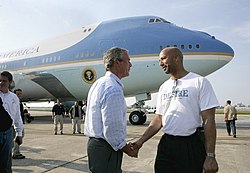Katrinagate

The term Katrinagate was coined based on Watergate in order to concentrate in one catchy word the negligence of the administration of the US President George W. Bush in connection with the disaster management after Hurricane Katrina in August 2005. The semantic link between the two terms is the role of the press as a means of exposing scandals that would otherwise be in danger of being covered up.
Hurricane Katrina had a devastating impact, partly attributed to its strength, partly to the region’s unique geography, and partly to a hesitant response from those responsible. President Bush did not interrupt his vacation until the third day, which many observers criticized as out of place. For days after the storm, tens of thousands had to wait in the city for help; the mayor of New Orleans , Ray Nagin , accused the US government in harsh terms, to have failed.
Eight days after the hurricane subsided, over 125,000 National Guard soldiers were deployed to help people in the disaster area and to stop looting. Was a disadvantage, however, that at this time 36% of the National Guard of Louisiana and Mississippi in Iraq were. Assigning additional soldiers to the crisis region did not seem a problem, but of all things the well-equipped combat troops - which can operate autonomously with weapons, vehicles, communication devices and their own field kitchens - were missing. It was also criticized that the National Guard was used for combat missions in Iraq. The main task of the National Guard, however, is to provide assistance in the event of natural disasters.
On the African American side, the government was accused of racism because the majority of the population that had been waiting for help for days was black. In an interview with the SZ on September 5, 2005, the historian and sociologist Mike Davis denounced the evacuation of the black population as a deportation .
The news magazine Der Spiegel reported on September 8, 2005 that the breaking of the protective dikes in New Orleans was part of a disaster control exercise. This suggests that the Federal Emergency Management Agency is incompetent in the disaster that has now occurred.
Follow and reception
After the press was initially lenient with the president, criticism rose as the full extent of the disaster became apparent. Columnist of the New York Times , Maureen Dowd , impressed with their product United States of Shame the tone of the criticism. A political investigation has been called for at various levels - including by the President himself. The president promised the victims of the disaster that the emergency aid would be significantly increased beyond the initially approved $ 10.5 billion. Aid of $ 50 billion for FEMA, $ 1.4 billion for the US armed forces and $ 400 million for an engineering corps was announced.
At a press conference on September 13, 2005, President Bush finally assumed responsibility for "possible breakdowns" in crisis management at the federal level. Previously, the head of FEMA, Michael Brown , had been replaced.
Web links
- United States of Shame , New York Times , Sep 3, 2005, Maureen Dowd
- DemocraticUnderground
- "First epidemic deaths found" , stern , September 8, 2005
- Bush threatens Katrinagate , article in Handelsblatt of September 6, 2005, accessed April 2, 2012
Remarks
- ↑ spiegel.de September 9, 2005: When all dams break
- ↑ nytimes.com: United States of Shame (opinion)
